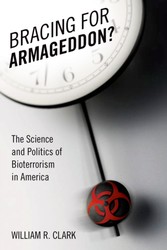Suchen und Finden
Bracing for Armageddon?: The Science and Politics of Bioterrorism in America
Since September 11th, the threat of a bioterrorist attack--massive, lethal, and unpreventable--has hung in the air over America. Bracing for Armageddon? offers a vividly written primer for the general reader, shedding light on the science behind potential bioterrorist attacks and revealing what could happen, what is likely to happen, and what almost certainly will not happen. The story opens with a riveting account of a bioterrorism scenario commissioned by the U.S. government. Using this doomsday tableau as a springboard, Clark reviews a host of bioterrorist threats (from agroterrorism to a poisoning of the water supply) and examines not only the worst-case menace of genetically engineered pathogens, but also the lethal agents on the CDCs official bioterrorism list, including Smallpox, Anthrax, Plague, Botulism, and Ebola. His overview of attempted bioterrorist attacks to date--such as the failed Aum Shinrikyo attempts in 1995 in Japan and the Anthrax attack in the US following 9/11--bolstered by interviews with a range of experts--shows why virtually all of these attempts have failed. Indeed, he demonstrates that a successful bioterrorism attack is exceedingly unlikely, while a major flu epidemic (such as the deadly epidemic of 1918 that killed millions worldwide) is a virtual certainty. Given the long odds of a bioterrorist attack, Clark asks, has the more than $40 billion the United States has dedicated to the defense against bioterrorism really been well spent? Is it time to move on to other priorities? In contrast to the alarmist fears stoked by the popular media, William Clark here provides a reassuring overview of what we really need to worry about--and what we dont.
Alle Preise verstehen sich inklusive der gesetzlichen MwSt.









